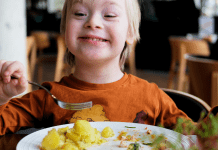When your child professes their boredom, do you offer suggestions or suggest they use their imagination? For example, do you suggest your children go outside to play? Or, do you come up with a craft or game on the spot, so they don’t feel the pain of having to come up with an activity on their own?
If you’re a parent that jumps in when your children cry out, needing someone to be imaginative on their behalf, I’d like to remind you that good enough parenting is good enough. As this Atlantic article pointed out, “good enough” is not to be confused with mediocre or apathetic parenting because lousy parenting is a real thing.
Bored Children Doesn’t Equal Bad Parenting
Good parenting lets your child be bored because they activate their imagination and find things to do on their own. You’re teaching them how to use their brain and body to come up with something to do. This way, they feel successful because they did something independently. Furthermore, you’re teaching strength and creativity!
Parenting is hard. You want to ensure your child is happy and healthy. You are not a failure if you don’t have it all together. Your children may be better if you don’t try to be perfect.
Intensive parenting is the predominant style in America. However, it isn’t preferred because it does not teach children grit and resilience. Intensive or helicopter parenting is when parents are overly involved in their children’s lives and try to control every aspect of their development. This parenting style has become more prevalent as parents strive to give their children every opportunity to succeed. However, research has shown that this type of parenting has negative consequences for children.
The Problem with Intensive Parenting
Children become less independent, more anxious, and less resilient at the hands of intensive parents. These kids also tend to perform worse academically than their peers raised with a more hands-off approach.
While helicopter parenting intends to help children succeed, the opposite is often true. Studies have shown that helicopter parenting can lead to adverse outcomes for kids, including:
- Lower grades and test scores: One study found that college students who reported having helicopter parents had lower GPAs than their peers. Another study found that elementary school students with helicopter parents were likelier to get lower grades on standardized tests.
- Less social competence: Kids helicoptered by their parents tend to have poorer social skills and are less liked by their peers than kids whose parents give them more independence. This is likely because helicopter parents do not give their children the opportunity to learn how to resolve conflict on their own or develop other social skills.
- Lower self-esteem: Kids who are constantly being told what to do and how to do it by their parents tend to have lower self-esteem than kids who are given more autonomy. This is because they never get a chance to experience the sense of accomplishment that comes from solving problems independently or making decisions alone.
Good Parenting Is Easier than You Think
Look, we’re just doing the best we can. No one gave you a rule book when you became a mom. If you’re like me, you lean on the mothers that came before us for good clues of what to do and what not to do. In addition, a vast amount of research will help us know what kids need at every stage of development.
If you’re feeling like you’re not doing enough as a parent, take heart in knowing that you’re probably doing just fine. Your children will thank you for it later. Just remember that good enough parenting is good enough! Your kids don’t need you to be perfect. They need their basic needs met and your emotional presence. You got this, mama!













